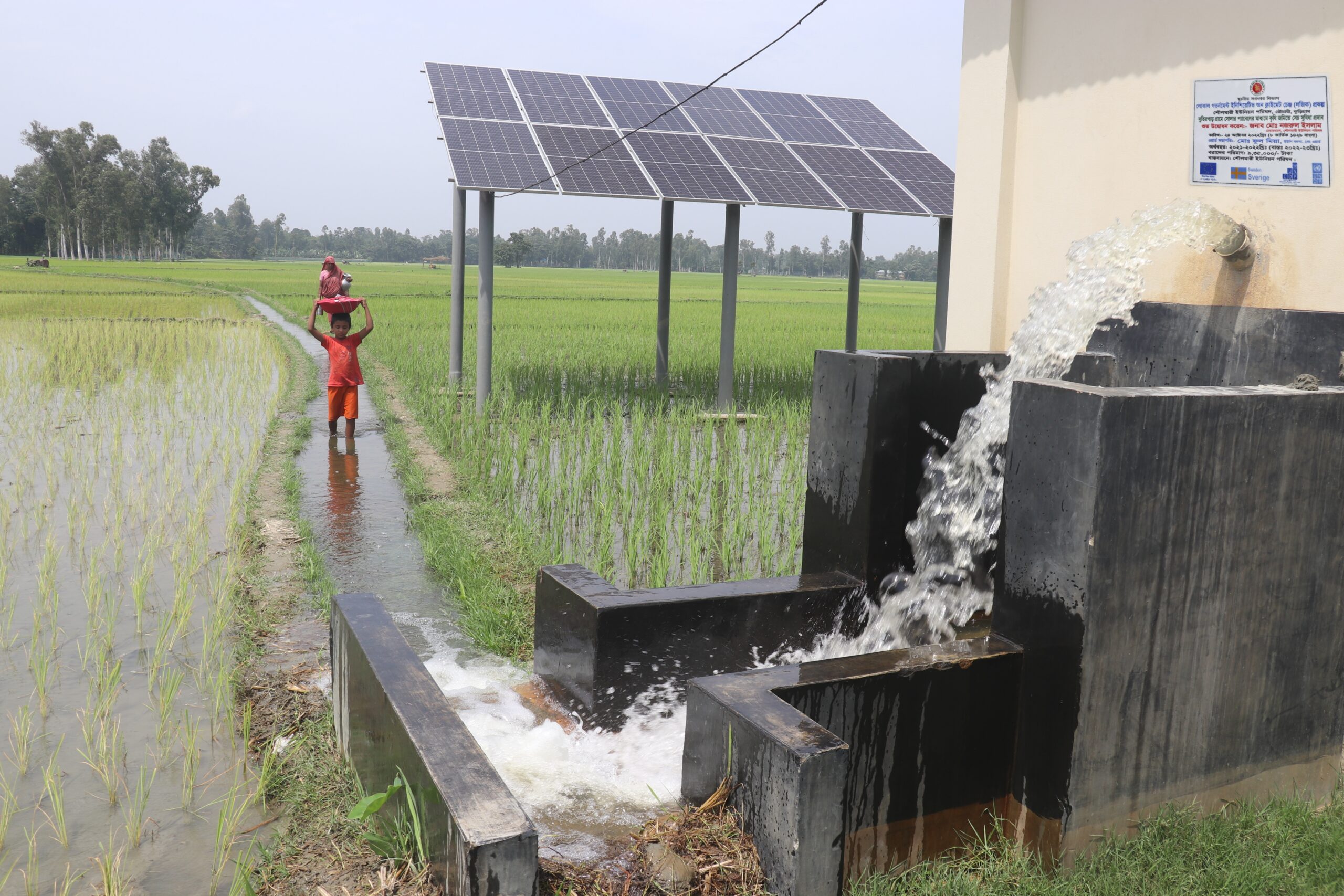Equipping Communities and Local Governments with the Tools to Finance Adaptation Interventions in Bangladesh
I
n Bangladesh, the Local Government Initiative on Climate Change (LoGIC) is enhancing communities’ ability to plan and finance local adaptation actions that suit their needs and contexts. Through this project, Local Government Division, Ministry of Local Government, Rural Development and Co-Operatives, Government of Bangladesh provides a mechanism for accessing and managing climate finance from various sources, a platform for sharing best practices and lessons learned, and a system for monitoring and evaluating effectiveness and impact. LoGIC strengthens local government institutions’ capacity to undertake risk-informed planning and budgeting and simultaneously empowers local communities to actively participate and lead local adaptation planning and budgeting.
Mohammed Fazla Azim, Joint Secretary and National Project Director, describes LoGIC as a participatory and inclusive process: “By facilitating access to markets and financing, the project enables climate-vulnerable communities to upscale adaptive practices, diversify income sources, and invest in climate-resilient livelihoods based on traditional knowledge at both national and local levels.”
Almost two million people have benefited so far, including more than 400 thousand households that are now better equipped to cope with the impacts of climate change. LoGIC currently operates in nine districts in Bangladesh: Kurigram, Khulna, Bagerhat, Bhola, Sunamganj, Patuakhali, Barguna, Rangamati, and Banderban. The project provides communities in these “climate hotspots” with the tools, knowledge, and financial resources required to navigate and withstand current and future climate realities.
“The project hopes to transform the story of vulnerability into one of resilience, empowerment, and sustainable development,” Fazla noted. LoGIC’s foundation is a participatory and inclusive process through which members of the community can identify, prioritize, design, and implement local adaptation actions, and the project also includes a mechanism for accessing and managing climate finance from various sources, such as national and local government funds, private sector contributions, and community savings. This is accompanied by a platform through which stakeholders can share best practices, lessons learned, and challenges associated with local adaptation planning and financing. Finally, LoGIC provides a system for monitoring and evaluating the effectiveness and impact of local adaptation actions.
Implementation of this framework has positive impacts from the local to the national scale. The project builds the capacity of both local governments and vulnerable communities to plan and finance locally led adaptation measures that responds to communities’ unique needs and priorities, and its grant financing mechanisms increase the resources these stakeholders need to operationalize these adaptation interventions. Establishing Climate-Smart Co-operatives and developing market linkages and value chains augment these actions and provide opportunities to scale up interventions and diversify participants’ income sources. Ultimately, these efforts influence local- and national-level policy by emphasizing the importance of prioritizing adaptation measures.

Local people were involved in managing funds for two grants in Bangladesh. Community Resilience Funds allow women-headed households to engage in climate-adaptive livelihoods, and Performance-Based Climate Resilience Grants supplement local government budgets for adaptation interventions. Recipients controlled how to use the funds to implement climate resilience actions, and community members formed committees to oversee the schemes and manage funds collected from user fees. Local Government Division, Ministry of Local Government, Rural Development and Co-Operatives, Government of Bangladesh supported these efforts by providing training on transparency and accountability, including financial management and conducting audits.
Almost all the recipients of the Community Resilience Funds were women, which has supported women’s adoption of climate-adaptive livelihoods, and LoGIC aims to empower women to engage in decision-making at the local level, which will ensure gender concerns are incorporated into adaptation strategies.
The prize money from the Local Adaptation Champions Award will be utilized to support the highest-priority adaptation project and to provide technical assistance to ensure the successful implementation of this initiative.
Patrick Verkooijen, Global Center on Adaptation CEO and a member of the Jury selecting this year’s winners, was impressed by LoGIC’s “outstanding and innovative approach to local government.”
This year, the Innovation in Devolving Finance category for the Local Adaptation Champions Awards focused on projects that are demonstrating innovative ways to provide flexible, long-term, and patient funding for adaptation at the local level.
The Local Adaptation Champions Awards reward inspiring and scalable locally led adaptation efforts to address the impacts of climate change and build resilience in the most vulnerable communities. Global Center on Adaptation, climate change experts, and a high-level Jury selected one winner in each of the four categories for 2023: Capacity Building, Business Adaptation Solutions, Innovation in Devolving Finance, and Women in Leadership. Over 500 applications were received from individuals and organizations for this year’s Awards, and applications came in from all over the world.
The four winners were presented with their Awards at an awards ceremony at the COP28 climate summit, and each winning project will receive €15,000 and get an opportunity to attend the Adaptation Fund’s readiness events.
“As the climate crisis continues to escalate, these Awards shine a light on community-led local adaptation measures that can effectively build resilience at the grassroots,” Verkooijen said. “We are excited to follow the winners’ journeys over the next year and beyond as they utilize the Award prize money and Adaptation Fund sponsorship opportunities to develop and scale up their work.”
This blog was originally published on GCA’s Global Hub on Locally Led Adaptation, a platform to inform, connect and inspire local communities and practitioners around the world with the latest knowledge and solutions for adapting to climate change.
The ideas presented in this article aim to inspire adaptation action – they are the views of the author and do not necessarily reflect those of the Global Center on Adaptation.